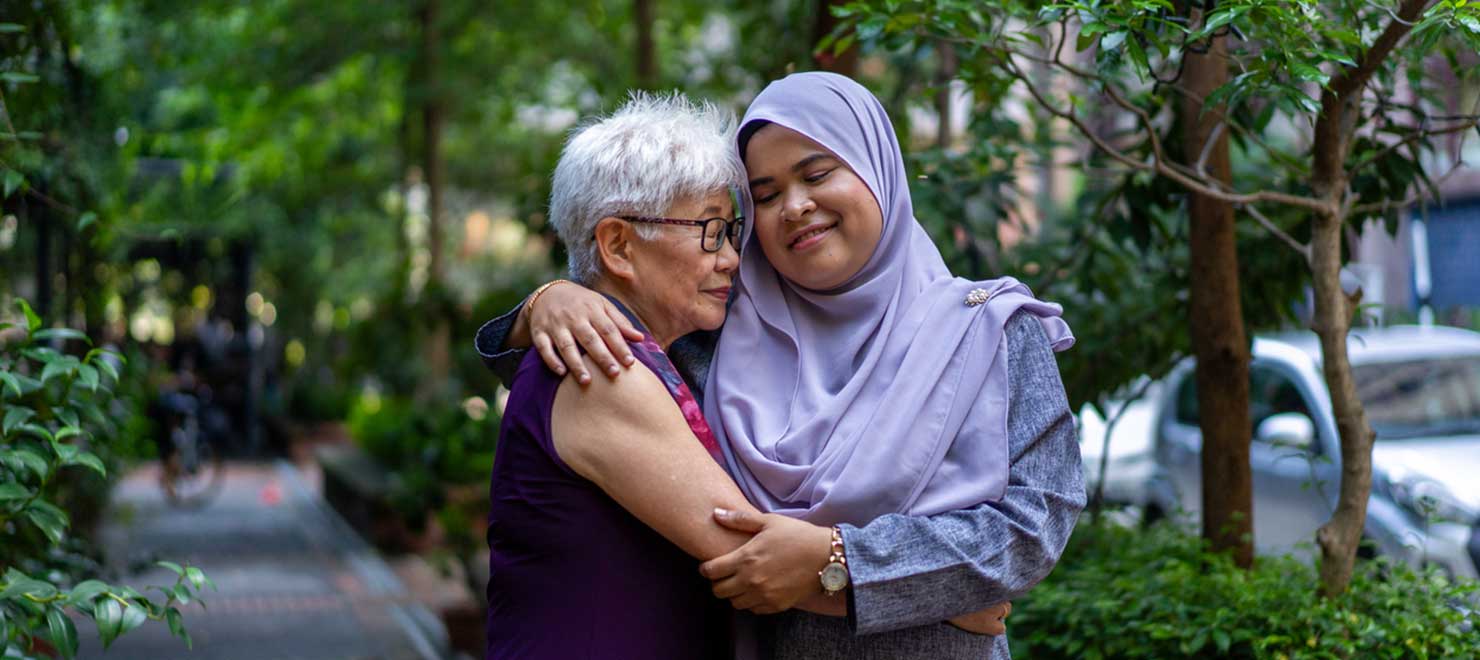
Losing a loved one often brings waves of emotions and changes that can be overwhelming for a caregiver. In this transition, here are some essential information to guide and support you along the way. Remember to take each step at your own pace and reach out whenever you feel ready for help and comfort.
Important documents to have on hand
For many legal and official post-death matters, these are the important documents that you will need:
- Death certificate or death extract*
- Marriage Certificate
- Birth Certificate of deceased’s children
- NRIC and other identification documents of all parties involved
- Bank account information
It is good to have all these documents in a folder so that they are kept safe and you can access them easily.
*A death extract replaces a lost or damaged death certificate.
Arranging a funeral and other legal matters
For the practical steps needed to honour your loves one’s last rites, do refer to this guide by LifeSG.
You may also refer to this comprehensive guide by Singapore Hospice Council for an overview on the things to do after the funeral, including legal and estate matters.
Who do you need to approach?
|
Banks
|
|
|
Insurance Companies
|
Inform your deceased loved one’s insurance companies. If there are payouts for the beneficiaries, the insurance company will let you know how it works. |
|
Lawyer/Solicitor
|
Inform your loved one’s lawyer or solicitor and obtain the will, if there is one. You will also need to inform the executor of the will (this means the person who will carry out your loved one’s wishes in the will). |
|
Utility Companies
|
Go through your loved one’s utilities such as electricity and telephone bills. You will have to inform the relevant companies and ask them to cancel GIRO, if the bills are being paid by GIRO. Find out on how to transfer ownership examples of utility accounts, HDB flat, etc. here. |
Living life after caregiving
Moving on with life after losing a loved one can be tough for some former caregivers. This transition often starts in the days before the death and could last a number of years, marked with important moments of change. You may feel a sense of emptiness from the loss of your loved one, the bittersweet end of your caregiving role or identity, and the challenge of adjusting to a new routine. During this time, feelings of loneliness and grief can become stronger. Having support from family, friends or even healthcare professionals becomes even more important.
It is important to acknowledge your feelings and give yourself the time you need to adjust. Remember, everyone’s grief journey is different, and there is no need to compare your experience with others.
Below are some tips that can help you with the transition:
- Be gentle with yourself. It’s perfectly normal to experience a wide range of emotions, and there is no set timeline for healing. Allow yourself to grieve without the pressure to ‘move on’ by a certain date.
- Adjusting to new roles. As you navigate this new phase, you may find yourself taking on new responsibilities, such as caring for your other elderly parent. Start with small, manageable routines and gradually build upon them at a pace that feels comfortable for you where you find new meanings to fill the void.
- Reach out for support. Connecting with close family and friends can provide an important support system. Sharing your experiences with those you trust can help lighten the burden of grief. Don’t hesitate to express your needs and let them know how they can support you during this difficult time.
- Empower others. Consider using your caregiving experience to help others. Connecting with support groups of your choice offer opportunities to befriend and guide new caregivers, allowing you to share your insights and foster a sense of community.
- Reflect on your journey. Completing a caregiving journey can bring up a mix of emotions. Take the time to reflect on your experiences, cherish the memories you’ve created, and acknowledge the profound impact you’ve had on the lives you cared for. Your journey is significant, and it is important to honour it with compassion and understanding.
- Explore new goals for yourself. It can either be volunteering in the community or even returning to the workforce. There are options for you out there, and take your time to find one that is suitable for you.
For more information, you can read Singapore Hospice Council’s Guide on Caring for Yourself After a Death.
If you find yourself having difficulty carrying out your day-to-day activities, excessive feelings of sorrow, resentment or guilt, and having thoughts of suicide or self-harm, it is advisable to seek professional help from bereavement support service providers listed below.
Support services to cope with grief
| Services | Contact no. |
|
Assisi Hospice Grief & Bereavement Care For all bereaved persons in the community |
WhatsApp Message: 9787 9890 |
|
Counselling and Care Centre For those who need bereavement counselling |
6536 6366 |
|
Hua Mei Counselling and Coaching For grieving elderly > 50 years old and their family/caregivers |
6593 9549 |
|
SAGE Counselling Centre For bereaved seniors > 50 years old and their families/caregivers |
1800-555-5555 |
|
O’Joy Care Services For those aged 18-49 in need of grief counselling |
6749 0190 |
|
Viriya Community Services For individuals and families impacted by loss |
6256 1311 vtc@viriya.org.sg |
|
Wicare Support Group For widows and their children |
6354 2475 / 9619 5091 |
Source: Singapore Hospice Council (Caring for Yourself after a Death) booklet, page 8
Do note that certain provider charge fees for their counselling sessions.
For more grief counselling services, feel free to browse this list on MyLegacy.




